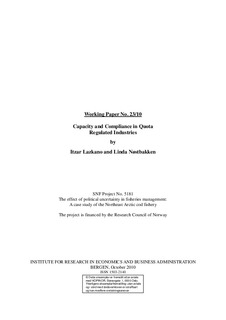Capacity and compliance in quota regulated industries
Working paper

Åpne
Permanent lenke
http://hdl.handle.net/11250/166316Utgivelsesdato
2010-10Metadata
Vis full innførselSamlinger
- Working papers (SNF) [809]
Sammendrag
Production quotas can restore efficiency in industries characterized by production externalities, such as resource industries and industries with environmental regulations. However, with imperfect quota enforcement, firms may have incentives to build up excess capacity relative to their quotas. Firms with more excess capacity may, in turn, have stronger incentives to violate quotas. We consider regulation with non-transferable and transferable quotas and investigate the relationship between enforcement, compliance and capital levels in the short and long run. In the short run, excess capacity leads to increased illegal production but a well-functioning quota market may alleviate the problem. In the long run, the possibility to exceed quotas gives firms incentives to build up excess capacity relative to their quotas. Furthermore, we show that the tougher the enforcement, the lower the firms’ production capacity. With non-transferable quotas, only violating firms are affected by tougher enforcement. When quotas are transferable, however, tougher enforcement causes violating firms to demand more quotas, which yields an increase in the quota price that effects all firms. The higher the quota price, the lower the production level. Hence, with tradable quotas, the quota price strengthens the effect of tougher (or weaker) enforcement. At the aggregate level, our results have strong policy implications because production quotas do not fully internalize the production externality when enforcement is imperfect. In such situations, additional management instruments
are required to correct the firms’ incentives to build up excess capacity, which exacerbates the non-compliance problem.
Utgiver
SNFSerie
Working paper2010:23